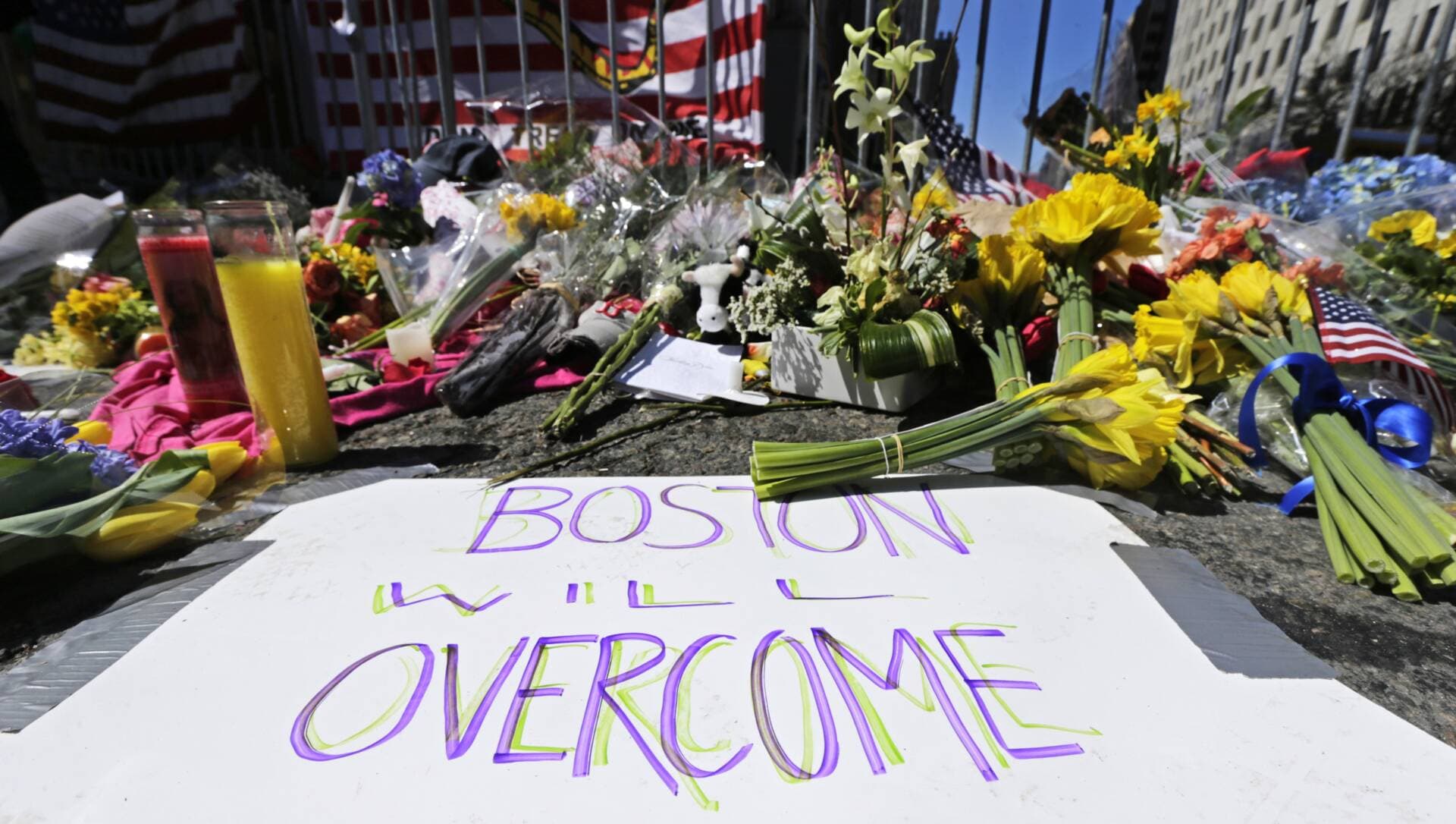Advertisement
How to protect your mental health while reflecting on the Boston Marathon bombings
As Massachusetts marks a decade since the Boston Marathon bombings, many people will pause to reflect on the three lives lost that day and the dozens of others who were physically hurt by the violence.
While these remembrances are a way for communities to grieve and express resilience, some mental health experts warn that for countless people who suffered anxiety and other psychological harms from the attacks, this week may bring difficult emotions to the surface.
Several therapists and psychologists suggest that for those who find the commemorations upsetting, there are steps you can take to lessen the impact of those emotions.
Avoid events that are reminders of the tragedy
"I no longer watch the marathon," said Manya Chylinski, who was at the finish line on April 15, 2013. "I went back in 2014 so that I would make sure that I wasn't afraid to go back. But I'm not interested in watching the runners anymore. It has just lost the excitement for me."
Chylinski, 57, can vividly recall sitting in the bleachers, just yards from the finish line, when she saw the first bomb detonate.
"I was standing there looking, I think, directly ahead, and a bomb exploded across the street from me," Chylinski said. "I don't know how I knew, but I knew it was a bomb, and I was frozen in place."
Chylinski wasn't physically hurt. She made it through the crowds of frightened people and gathered with her friends near the Back Bay train station, a few blocks away. She said they all just looked at each other, not fully understanding what they had witnessed. Unsure what to do next, they parted and went home.
"I don't know how I knew, but I knew it was a bomb, and I was frozen in place."
Manya Chylinski
Chylinski watched and read news reports trying to get clarity. The next day, she went to work and took a conference call. She quickly realized something was wrong.
"In the middle of the call, I smelled the bomb, and I reacted the way that I reacted the day before, which was I was frozen in place," Chylinski recalled.
Although she soon realized she wasn't in actual danger, for months, Chylinski would sometimes smell explosives or even visualize destruction that wasn't really there. She wasn't functioning well.
"I had trouble taking care of myself, trouble eating, trouble sleeping," she said. "When I did sleep, I had nightmares."

Eventually, Chylinski was diagnosed with post-traumatic stress disorder, or PTSD, a psychological condition that can be triggered by a traumatic experience. While not everyone who witnesses a tragic event develops PTSD, for those who do, it's typically diagnosed in the weeks after the devastating event, according to Sandro Galea, dean of the Boston University School of Public Health.
The emotional effects of a mass trauma can continue for years, even decades. If the events organized around the marathon are too much, Galea advises staying away from them.
"I would encourage anybody to think carefully about whether or not a particular event or particular commemoration is helping them feel better or not," Galea said. "And if it does not, if they're feeling like it's making it worse, then they should take a step back and not engage."
This year, Chylinski will be out of town with friends, away from the marathon and the 10-year remembrances.
Advertisement
When to seek help from a mental health professional
When a person experiences danger, experts say the brain can essentially get stuck in a pattern of response to that threat. Dr. Alisha Moreland-Capuia, founder and director of the Institute for Trauma-Informed Systems Change at McLean Hospital, explained that fear is a survival mechanism: The brain stores fearful memories to remind us to avoid similar situations. Problems arise when emotions like fear and anxiety don't shut off.
"We're not designed to be under chronic stages of stress and/or fear," Moreland-Capuia said. "When it doesn't turn off, and it starts to get in our in the way of our ability to function and to do everyday life, that's when we're starting to kind of move or brush up against the edges of a post-traumatic [stress disorder], a more chronic process that would really benefit from some additional expert support."
Studies have shown higher rates of depression and PTSD among those who experienced or witnessed the bombings. On this somber anniversary, Moreland-Capuia said it is normal to recall what happened, but remembering should not interfere with daily tasks or remain top of mind.
She emphasized that people should not be ashamed to admit that they're struggling with painful memories — not only of the bombings, but of the following days when Boston residents had to "shelter in place" during the search for the bombing suspects.
"Whether we are conscious of it or not, safety is the one thing that we are always concerned about," Moreland-Capuia said. "So there can be a trigger to that moment that we felt the most unsafe, when we felt the most pain."
"Whether we are conscious of it or not, safety is the one thing that we are always concerned about. So there can be a trigger to that moment that we felt the most unsafe, when we felt the most pain."
Alisha Moreland-Capuia
But, she added, these thoughts can sometimes become "dysfunctional," or create a sense they're "taking over our lives." That's when she recommends "meaningful intervention" to heal, with help from a mental health professional.
Boston Mayor Michelle Wu's office released several mental health care recommendations for people struggling with disturbing marathon memories. The advice includes talking about difficult emotions, taking time off if needed and checking in with a physician.
Connect with friends and family
Research conducted over the last decade suggests about half of all U.S. residents have experienced a traumatizing incident. And, federal researchers have called the psychological effects of mass disasters a "major public health concern."
Those with pre-existing mental health conditions or those who have experienced previous traumatic events, such as military veterans, are more likely to be affected by this year's remembrances. Galea, of Boston University, and others advised those who find themselves reacting strongly to accept that their feelings are real and connect with loved ones for support.
Boston University psychiatry professor Mark Miller, also with the Veterans Administration's Boston division of the National Center for PTSD, conducted a study that found many veterans experienced an increase in PTSD symptoms after the bombings. Miller said veterans should talk about their feelings with loved ones and reflect on how they're reacting this year.
"I would say people shouldn't be surprised if they have trouble sleeping, or if they're anxious and tempted to fall back into bad habits like drinking without knowing why," Miller said. "It's likely the approach of this anniversary and then all the memories that will probably be conjured up in association with it."

Avoid graphic media and online images of the bombings
Even those not in Massachusetts showed symptoms of distress after the bombings, according to researchers. Roxanne Cohen-Silver, a professor at the University of California at Irvine, says the bombings were the first major U.S. tragedy where graphic images were posted and disseminated on social media — without editorial restrictions.
Her research compared people in metro Boston to those in other parts of the country. It found that anyone exposed to the gruesome images from the marathon finish line, regardless of their location, was more likely be emotionally harmed.
"So we actually have seen a cycle in which people who engaged in a lot of media are associated with stress and anxiety and worry," Cohen-Silver said.
This weekend's anniversary could be a trigger for many people, she added. She offered this advice: Stay away from graphic images and focus on positive things, such as the slogan "Boston Strong," which stresses the importance of resilience and not letting terrorism derail a community.
Cohen-Silver said while the country is more sensitive to mental health now compared to 10 years ago, and warnings about graphic images are more common, commemorations of mass traumatic events tend to highlight the pain of those who were physically injured.
"There is clearly a focus that doesn't simultaneously say, 'let's make sure that the people who were at the finish line who witnessed this tragedy are also taken care of, even though they left with four limbs,' " Cohen-Silver said.
Improvements in mental health care after disasters
Reviews of the mental health support provided after the 2013 bombings show that some services focused on first responders and many of the race participants, but those who witnessed the events were expected to seek help at outpatient clinics or with private clinicians.
Many of those who struggled emotionally after the bombings said they had difficulty recognizing what they were experiencing and finding support.
Manya Chylinski said it took time to get help. She reached out to the Massachusetts Office for Victim Assistance, which provides resources to all crime victims in the state. Chylinski also underwent years of therapy and worked with a trauma counselor.
Chylinski said she found support groups helpful and joined the international organization "Strength to Strength" for those who've survived terrorist attacks. The group advises members to continue to talk about their feelings and connect with others to ease distress if they're reminded of the attack. Chylinski has become what she calls an "accidental advocate," urging officials to support those affected by a mass tragedy whose injuries aren't visible.
She worked with Democratic Congresswoman Ayanna Pressley on legislation known as the Post Disaster Mental Health Response Act. It expands federal mental health support for survivors of federal emergencies. President Biden signed the bill into law in December.
From her experiences after the marathon bombing, Chylinski knows how important mental health support can be.
"We need to be ready with resources to help those who need it and to talk about the mental health impacts, and the aftermath," Chylinski said. "Not everybody needs formal mental health treatment after something like this. But everybody needs some form of support and some level of validation that what they are experiencing is real."
This segment aired on April 12, 2023.
